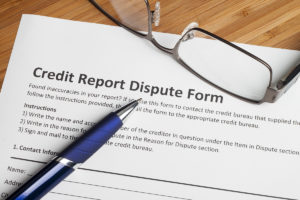
Credit report errors happen more often than most of us would like to think. The Consumer Financial Protection Bureau has listed credit report errors as one of the top complaints filed. Believe it or not, one out of every 20 of us have errors on one of our three major credit reports.
These errors can harm our credit scores, making it difficult to secure credit for car loans or credit cards, be hired for a job or approved for an apartment lease. And correcting these mistakes can take months, and in some cases, years.
This is where a credit report lawyer can help. Read on to find out how consulting with an experienced credit report lawyer can help evaluate errors on your report and determine whether you may have a lawsuit to bring against the credit bureau, or furnisher, for improperly reported credit information. The Fair Credit Reporting Act protects a consumer’s rights by promoting the accuracy, fairness and privacy of information in the files of consumer reporting agencies.
5 Steps to Address your Credit Report Problems
 Step 1: Obtain current credit reports
Step 1: Obtain current credit reports
A credit report lawyer will want you to provide current copies of your credit reports from the three main credit reporting agencies – Transunion, Experian and Equifax. The reports may be obtained by writing to each credit bureau for a copy, or visit: annualcreditreport.com. Every twelve months, you are entitled to a free copy of your report from these bureaus. Be sure to obtain a report from each bureau as information on one report may or may not appear on another. You need to see how an account is listed on each report.
 Step 2: Gather documents that illustrate the error
Step 2: Gather documents that illustrate the error
You and the credit report lawyer will review the reports for accuracy. If there is an incorrect listing, you will be asked to gather documents, such as account statements, correspondence, cancelled checks, and proof of payment, that show why the listing is an error. For example, if your report shows that you still owe a particular creditor but you had satisfied the obligation, you would need to gather your proof of payment and then prepare a dispute letter.
 Step 3: Send a written dispute to the Credit Bureau and/or Credit Furnisher
Step 3: Send a written dispute to the Credit Bureau and/or Credit Furnisher
Disputes to the credit bureau must be in writing. It is important to clearly identify the problem, provide supporting documents that show why a listing is incorrect, and request a specific action for the credit bureau to take. Mail your letter to the credit bureau by Certified Mail Return Receipt so that you have proof of the date it was received. The bureaus have 30 days to respond to your dispute. If the credit bureau does not correct the listing, you may need to send a second, or possibly a third, written dispute. Be sure to keep copies of all dispute correspondence.
Step 4: Maintain a Good Paper Trail
Addressing errors on your credit reports takes time. You must keep your files organized with copies of all dispute correspondence, supporting documents, and credit reports. If the errors are not corrected, your credit report lawyer will need to review your documents and evaluate whether your legal rights have been violated under the Fair Credit Reporting Act.
 Step 5: Get Help from an Experienced Credit Report Law Firm
Step 5: Get Help from an Experienced Credit Report Law Firm
Flitter Milz, P.C. is a nationally recognized consumer protection law firm experienced in working with consumers to resolve legal issues related to credit reporting privacy and accuracy. If you’ve been battling the credit bureaus to correct errors on your report but haven’t gotten anywhere, contact us for a no cost consultation. We will fight for your rights and accurate credit reports.







